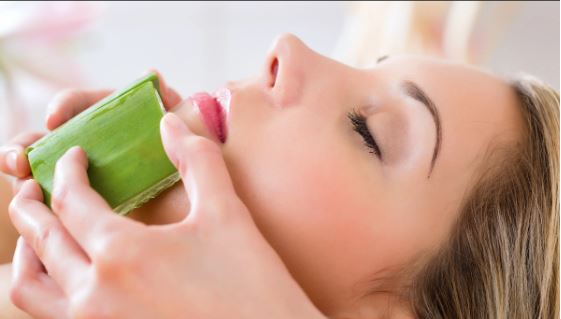10 Essential Skincare Tips for Acne Control
Struggling with acne? You’re not alone! It can be frustrating trying to find the right skincare routine to clear up breakouts. To help you get glowing skin and keep blemishes at bay, we’ve compiled 20 purifying skincare tips packed with practical advice and easy-to-follow steps. Let’s jump into what really works for acne control!
Incorporating Natural Remedies
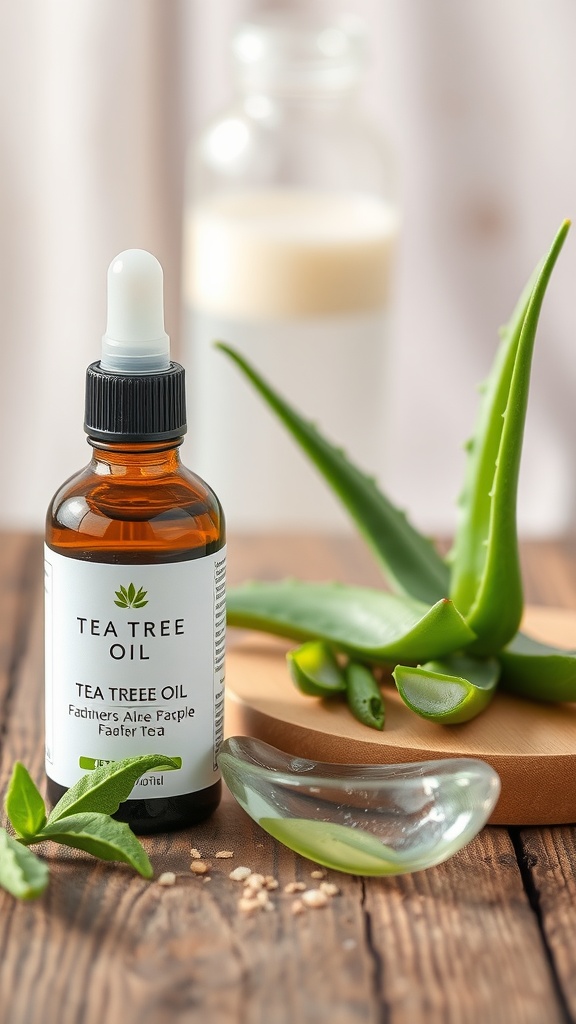
When it comes to managing acne, natural remedies can be a wonderful addition to your skincare routine. The image here showcases tea tree oil, a popular choice for those seeking gentle yet effective acne control. Its antibacterial properties help reduce inflammation and prevent breakouts.
Pairing tea tree oil with aloe vera, which is also present in the image, offers soothing benefits. Aloe vera hydrates the skin and helps to heal redness and irritation. Together, these two ingredients make a powerful duo for acne-prone skin.
To use tea tree oil, simply dilute a few drops with a carrier oil like jojoba or coconut oil, and apply it directly to the affected areas. For aloe vera, you can apply the gel directly from the leaf for a cooling effect. Incorporating these natural remedies can lead to clearer skin and a more balanced complexion.
Cleansing Techniques for Clear Skin
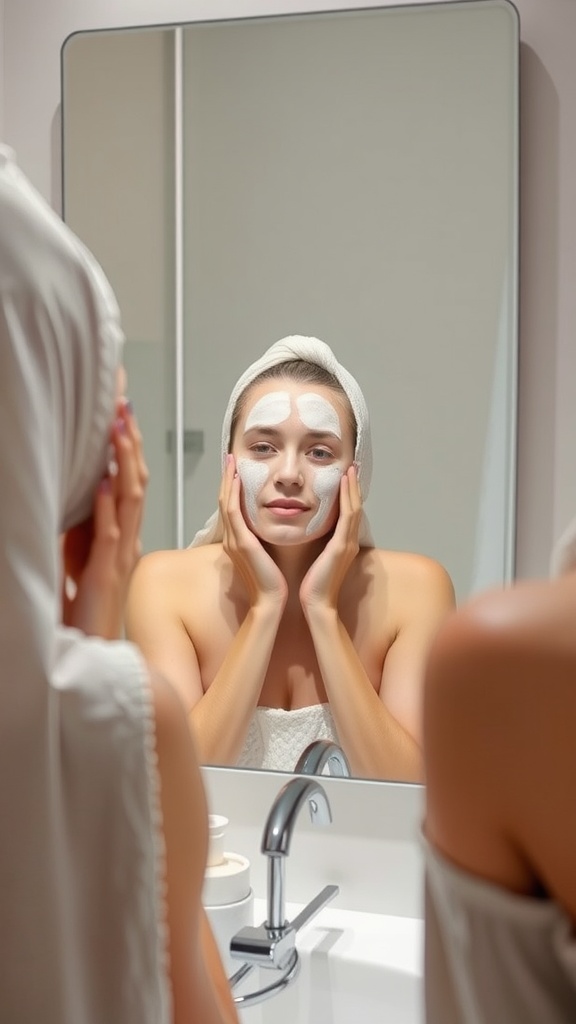
In the quest for clear skin, cleansing plays a key role. The image shows a person in a relaxed setting, applying a facial mask while looking in the mirror. This moment highlights an essential part of any skincare routine: taking time to care for your skin.
Start by choosing a gentle cleanser that suits your skin type. If you have acne-prone skin, look for ingredients like salicylic acid or tea tree oil. These components help unclog pores and reduce breakouts.
Next, the application technique matters too. Use circular motions to massage the cleanser into your skin. This not only cleanses but also boosts circulation, giving your skin a healthy glow.
Don’t forget to rinse with lukewarm water. Hot water can strip your skin of its natural oils, leading to dryness and irritation. Pat your skin dry with a clean towel, and consider following up with a toner to balance your skin’s pH.
Incorporating these cleansing techniques can make a noticeable difference in your acne control journey. Remember, consistency is key!
Hydration and Its Role in Acne Management
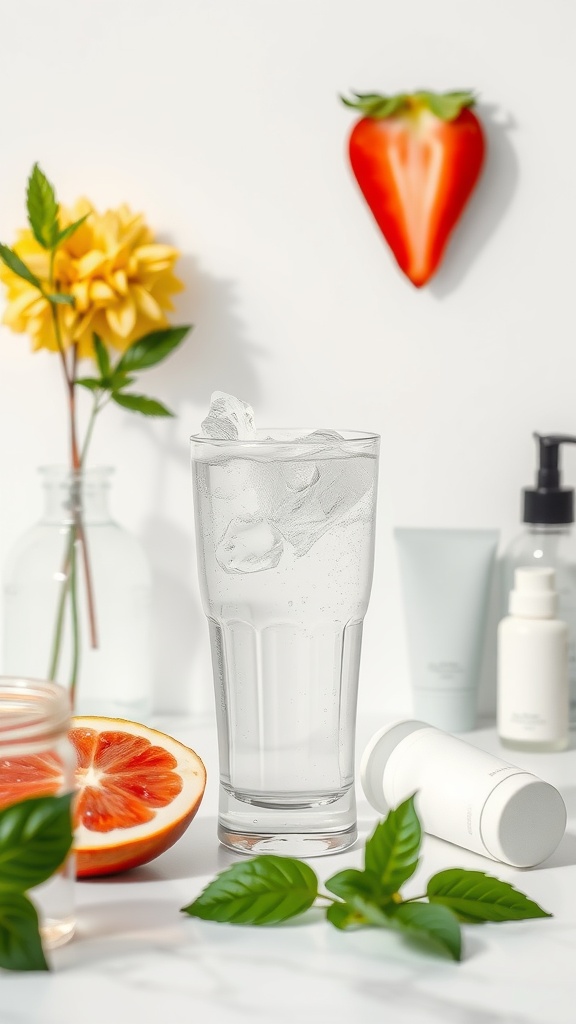
Hydration is super important when it comes to managing acne. The image shows a refreshing glass of water, surrounded by vibrant fruits and greenery. This visual perfectly captures the essence of staying hydrated. Water helps to flush out toxins and keeps your skin looking fresh and clear.
One major benefit of drinking enough water is that it helps maintain your skin’s moisture balance. When your skin is adequately hydrated, it’s less likely to produce excess oil, which can contribute to acne breakouts. So, keeping that glass filled is a simple way to support your skin health.
Fruits like the grapefruit and herbs nearby also remind us that hydration can come in various forms. Eating water-rich foods can be just as effective as drinking water. Incorporating these elements into your diet can help you stay hydrated and improve your skin’s condition.
Lastly, don’t forget that hydration is not just about drinking water. It includes using hydrating skincare products too. Moisturizers that suit your skin type can help lock in moisture and create a protective barrier against environmental stressors. So, whether it’s from your glass or your skincare routine, hydration is key!
Exfoliation: Types and Benefits
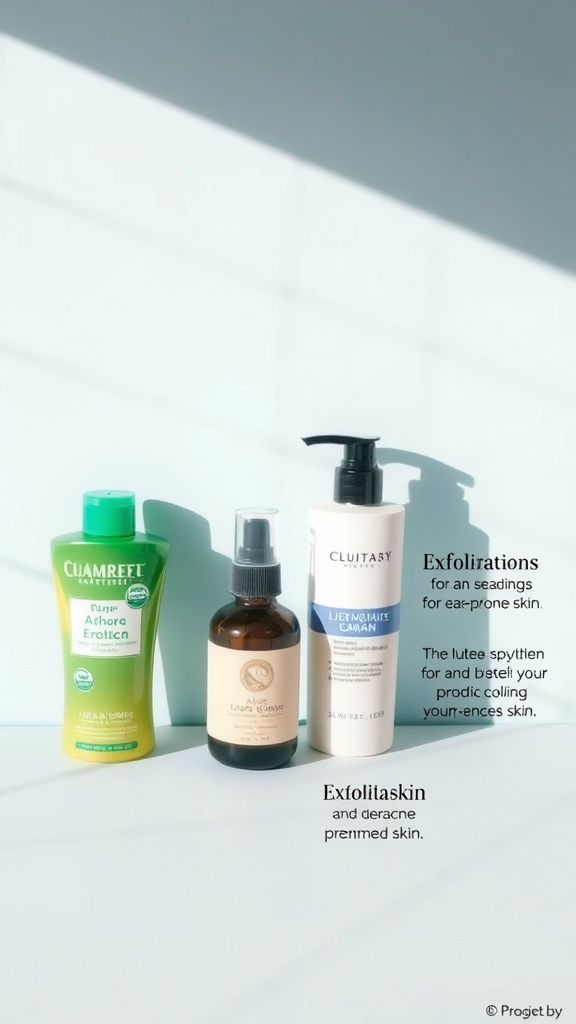
Exfoliation is a key step in any skincare routine, especially for those dealing with acne. The image showcases three different exfoliants that cater to various skin needs. Each product has unique benefits that can help clear up breakouts and improve skin texture.
The first product, with its green packaging, is designed for oily and acne-prone skin. It contains ingredients that help unclog pores and reduce excess oil. The second bottle features a gentle formula that hydrates while exfoliating, making it perfect for sensitive skin types that still need some sloughing.
The last product offers a more intensive treatment. It’s formulated to deeply cleanse and renew the skin, making it a great choice for those looking for a thorough exfoliation. Using these products regularly can lead to a smoother complexion and fewer blemishes.
The Role of Diet in Skin Clarity
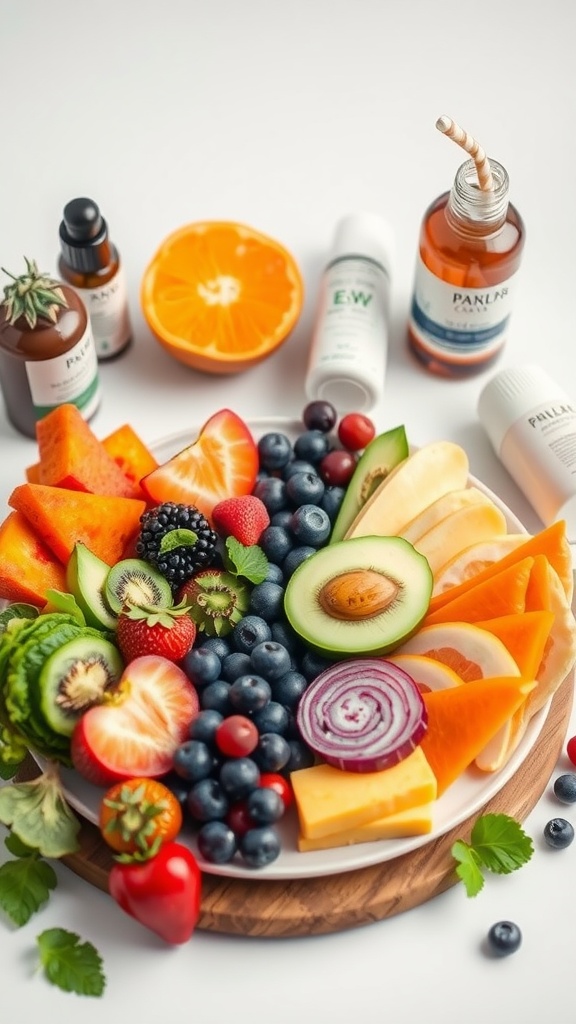
Your diet plays a huge role in the health and clarity of your skin. A colorful plate filled with fresh fruits and veggies can be a game changer. Imagine a spread featuring juicy oranges, vibrant strawberries, and crunchy cucumbers. Each bite nourishes your skin from the inside out.
Eating a variety of fruits and vegetables gives your body essential vitamins and minerals. For instance, vitamin C from oranges helps in collagen production, while antioxidants in berries fight skin damage. This plate not only looks good but also supports clearer skin.
Staying hydrated is just as important. Pairing your meals with water or herbal teas can keep your skin plump and radiant. Think of your body as a garden; it needs the right nutrients to flourish. So, next time you’re snacking, opt for that colorful fruit plate and feel the difference.
Understanding Acne Triggers
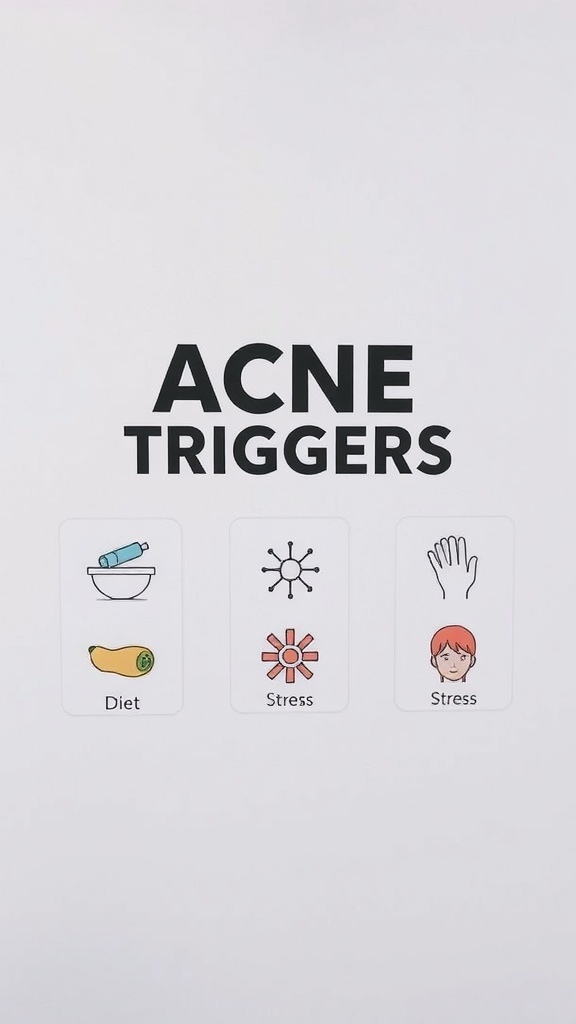
When it comes to acne control, knowing what triggers breakouts is key. The image highlights three main acne triggers: diet, stress, and skin contact. Each of these can cause your skin to react in different ways.
The first trigger, diet, emphasizes that what you eat can play a role in how your skin behaves. Foods high in sugars and dairy may lead to more breakouts for some people. Keeping a balanced diet can be beneficial in managing acne.
Next up is stress. The image shows that stress can lead to hormonal changes, which might increase oil production and lead to acne flare-ups. Taking time to relax and manage stress is important for your skin health.
Lastly, repeated skin contact, like touching your face or wearing items like gloves, can transfer bacteria and oils to your skin. This can cause pores to clog and lead to more blemishes. Being mindful of how often your skin comes into contact with hands or other surfaces can help reduce breakouts.
Importance of a Consistent Skincare Routine
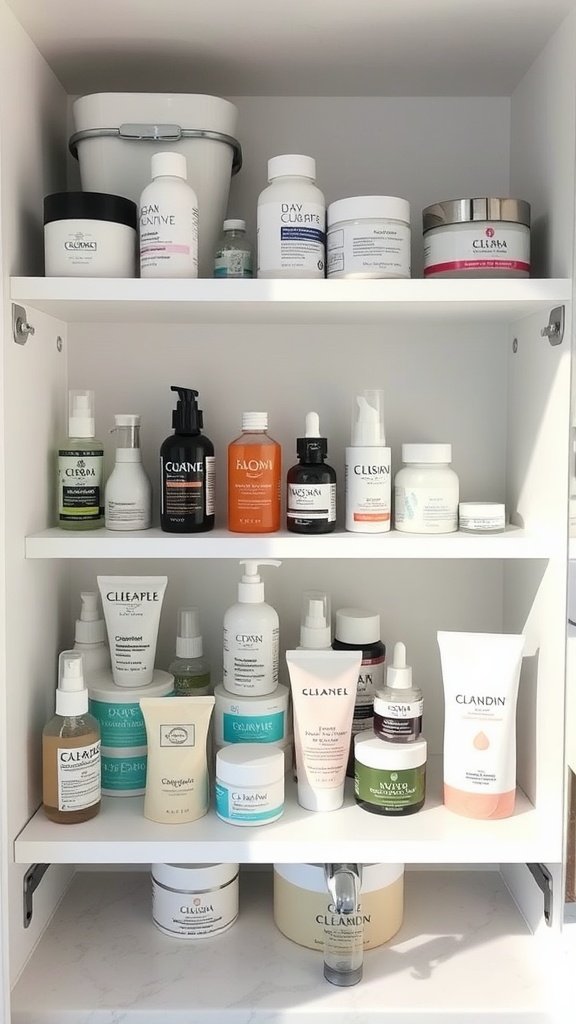
A consistent skincare routine is a key player in managing acne. The image above shows a well-organized skincare cabinet filled with various products, each serving a unique purpose. This variety illustrates how different formulations can address specific skin needs.
Sticking to a routine helps build a relationship with your skin. Regular use of cleansers, toners, serums, and moisturizers ensures that your skin gets the right balance of hydration and treatment. It’s not just about applying products whenever you feel like it; commitment is essential.
When products are used consistently, they can work together to combat issues like acne. For example, using a salicylic acid cleanser daily can help keep pores clear, while a good moisturizer locks in hydration, preventing dryness that can trigger more breakouts. The organization in the image reflects a thought-out approach to skincare that can lead to clearer skin.
Remember, results take time. It’s important to be patient and give your routine a chance to show its effectiveness. Changing products too frequently can confuse your skin, making it harder to see what works. So, find a routine that suits you and stick with it for the best results.
Choosing Non-Comedogenic Products
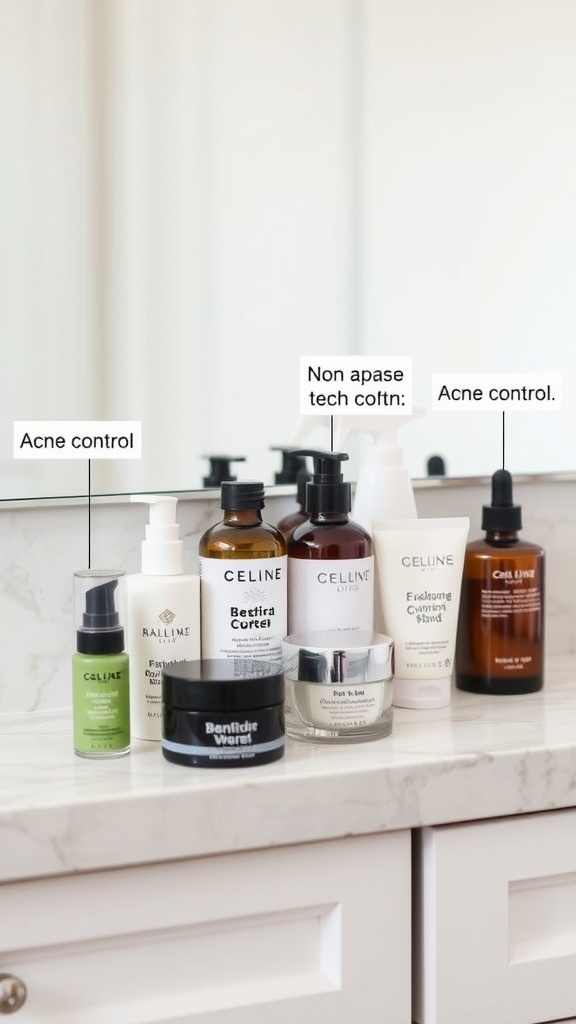
When dealing with acne, selecting the right skincare products is key. The image shows a variety of bottles and jars lined up on a countertop, each labeled for specific purposes like ‘Acne control’. This visual serves as a reminder that not all products are created equal.
Non-comedogenic products are specially formulated to avoid clogging pores. This can significantly help in managing breakouts. Look for ingredients that are lightweight and oil-free. The labels on the products in the image emphasize their acne-fighting capabilities, highlighting the importance of reading what’s inside.
Finding the right product may take some trial and error. Start by introducing one new item at a time into your routine. This way, you can monitor how your skin reacts. If a product causes irritation or additional breakouts, it might not be the right fit for you.
Remember to check labels for terms like ‘oil-free’ and ‘non-acnegenic’. These can guide you towards effective options for your skincare regimen. Ultimately, the goal is to keep your skin clear while ensuring it stays hydrated and balanced.
When to Consult a Dermatologist

In the journey of managing acne, knowing when to seek expert help is key. The image shows a friendly conversation between a patient and a dermatologist. This setting is perfect for discussing skin concerns and getting personalized advice.
If your acne is persistent or severe, it’s time to consult a dermatologist. Signs include painful cysts, frequent breakouts, or acne that doesn’t respond to over-the-counter treatments. A professional can recommend effective treatments tailored to your skin type.
Another reason to visit a dermatologist is if your acne is causing emotional distress. Skin issues can impact self-esteem, and it’s important to address both the physical and emotional aspects of acne. A dermatologist can help you find the right approach.
Keep in mind that early intervention can prevent scarring and long-term skin issues. Don’t hesitate to book that appointment if you feel that your acne is out of control!
Stress Management Techniques for Skin Health

Stress can play a big role in skin issues, including acne. Managing stress is key to keeping your skin clear and healthy. The image showcases a peaceful scene of a person meditating outdoors, surrounded by nature. This kind of tranquility can greatly benefit skin health.
Practicing mindfulness through meditation or yoga can reduce stress levels. Just a few minutes of deep breathing can help calm your mind and improve your skin’s texture. Spending time in nature, as seen in the image, also promotes relaxation and can boost your mood.
Another great approach is to incorporate daily physical activity. Whether it’s a brisk walk or a full workout, exercise helps release endorphins, which can lift your spirits and help combat stress-related skin problems.
Finally, don’t underestimate the power of a good night’s sleep. Quality sleep supports your skin’s repair processes. So, create a calming nighttime routine to help you unwind and get the rest you need.


